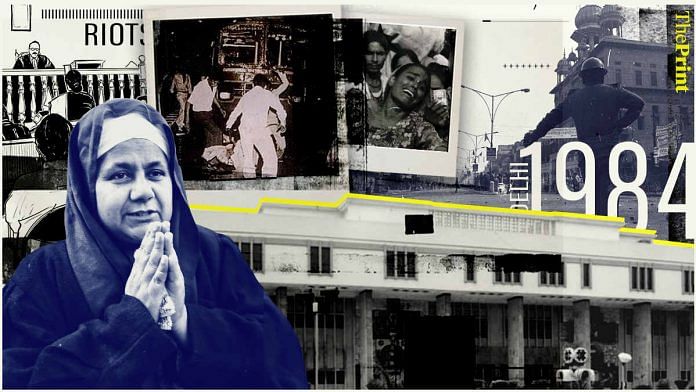New Delhi: When she was just 16 years old, Nirpreet Kaur bore witness to an unfathomable act of brutality: a bloodthirsty mob setting her father Nirmal Singh ablaze and torching the homes of her family and neighbours in Delhi Cantonment’s Raj Nagar locality.
The events of that day, 1 November 1984, and other atrocities of the anti-Sikh riots, are forever seared in Nirpreet Kaur’s memory. However, what haunts her even more, 39 years later, is the elusive quest for justice, not just for her but for other victims, some of whom have died waiting.
According to government estimates, around 2,700 people were killed in Delhi during the riots of 1984, which erupted in the aftermath of the assassination of then Prime Minister Indira Gandhi by two Sikh bodyguards. Many of those who survived were also condemned to wait indefinitely for all the accused to be held accountable.
As reported earlier by ThePrint, only 25 cases out of the original 587 FIRs registered in connection with the riots resulted in a conviction. Of these, a mere dozen were murder cases. Overall, 440 convictions have been secured, with some accused found guilty on as many as seven charges.
The latest conviction was in December 2018, when the Delhi High Court set aside a trial court’s acquittal of former Congress MP Sajjan Kumar and sentenced him to life in prison for the killings of five members of a Raj Nagar family.
Though this case did not pertain specifically to the murder of Nirmal Singh, his daughter Nirpreet was a key witness. In its verdict, the court praised her and two other eyewitnesses for their “courage and perseverance” and for sticking “firm to their truth”.
Kumar has since challenged this judgment in the Supreme Court, where the matter is pending.
Meanwhile, the savage murder of Nirmal Singh — among other cases — is still stuck in limbo despite signs of a breakthrough six years ago.
In 2017, a Delhi High Court bench issued a show-cause notice to the Delhi government on why a new trial should not be held for 10 men who were acquitted in connection with multiple cases of murder in Raj Nagar on 1-2 November 1984, including the killing of Nirmal Singh.
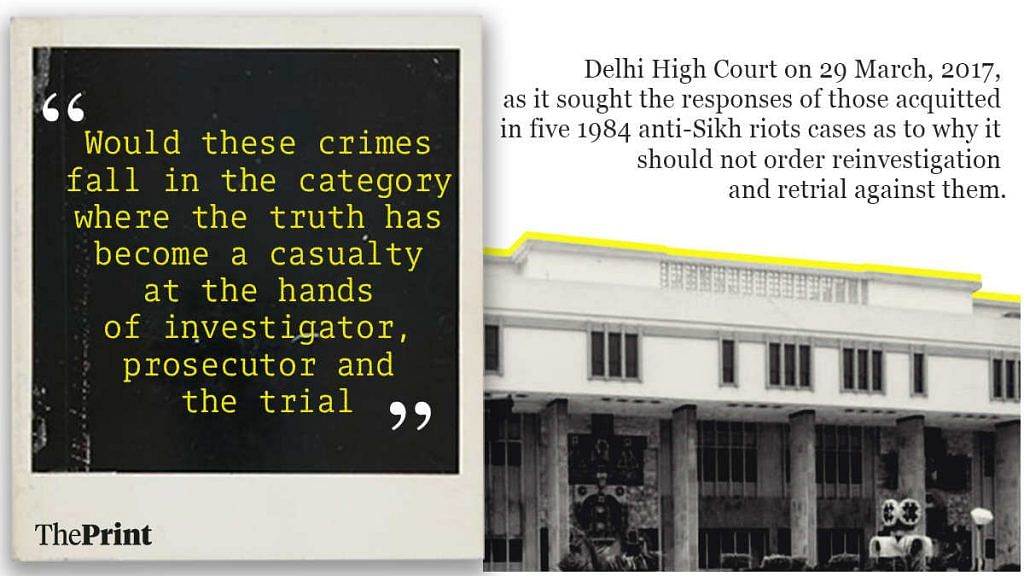
The HC observed that the 1986 acquittals reflected a “very perfunctory and hasty disposal of cases”, the investigation lacked rigour, and even the eyewitnesses were not served summons properly.
In line with this, Nirpreet Kaur told ThePrint that she never received summons to appear before the trial court as these were sent to the address where her home was set on fire.
The accused in question were former Congress councillor Balwan Singh Khokhar, ex-MLA Mahender Singh Yadav (who died in 2020), Dhanraj, Mahender Singh, Dhanpal, Ved Prakash, Shiv Charan, Ramji Lal Sharma, Vidyanand, and Mahender Singh Manan.
These 10 men were named in separate complaints by five Sikh widows in incidents of murder and rioting in Raj Nagar on 1-2 November 1984, but the Delhi Police had clubbed all five cases in one chargesheet.
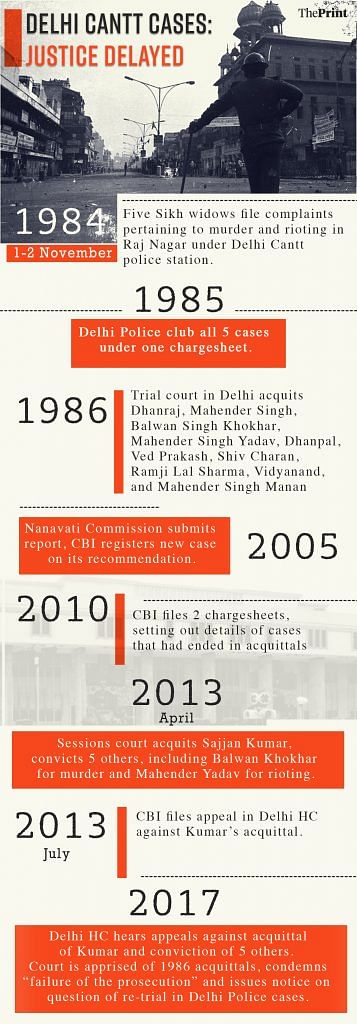
Sampuran Kaur— Nirmal Singh’s wife and Nirpreet Kaur’s mother— was one of the five widows.
But despite the HC’s powerful indictment of the investigation and prosecution, not much has happened since the court’s show-cause notice, Nirpreet Kaur told ThePrint.
The matter has been pending in the Supreme Court since May 2017, when one of the accused, Mahender Singh Yadav, challenged the Delhi HC’s interim order.
Kaur is a witness in one case and has appealed before the top court to be an intervening party, but says she hasn’t heard back.
Also read: The 4 who never gave up the fight, and succeeded in putting Sajjan Kumar in jail
Murder & acquittal
Nirpreet Kaur is in her mid-50s now, but she remembers every horrifying moment leading up to and during her father Nirmal Singh’s death.
On 31 October 1984, a day before the carnage, she recalls Congress councillor Balwan Singh Khokhar paying a visit to her Raj Nagar home.
“Balwan Singh Khokhar had visited our house the previous day asking my father to keep his brother as a driver in his house. He actually wanted to see how many people live with us,” Nirpreet told ThePrint.
“He led the mob the very next day. My father confronted him, and Khokhar told him that he will explain and send them away. They then lit our house and we fought for hours to stay alive,” Kaur said.
Court records document the horrors that followed in harrowing detail, including how the mob beat, tried to drown, and finally burned Nirmal Singh.
Nirpreet’s mother Sampuran Kaur subsequently filed a complaint with the Delhi Police, which was eventually clubbed with four other FIRs filed by Sikh women. All were from Raj Nagar and widowed during the attacks of 1-2 November.
Then, in what seemed like a travesty to family members like Nirpreet, a trial court in 1986 acquitted the 10 men named in this set of complaints, namely Balwan Singh Khokhar, Mahender Singh Yadav, Dhanraj, Mahender Singh, Dhanpal, Ved Prakash, Shiv Charan, Ramji Lal Sharma, Vidyanand, and Mahender Singh Manan.
The matter, though, did not end there.
For these and other cases, the path to “justice” was a long and convoluted one, with no fewer than four commissions, nine committees, and two special investigation teams being set up over the years.
Along the way, some cases that had seemingly been done and dusted were resurrected, some almost by happenstance.
‘Truth has become a casualty’
In 2005, the one-member Nanavati Commission, set up to probe the 1984 anti-Sikh riots, recommended that the CBI should reopen four cases.
One of these cases pertained to the Delhi Cantonment violence, where Sajjan Kumar was accused of inciting mob violence. In 2013, he faced trial in the CBI case but was acquitted of murder charges, while five others were convicted — Balwan Singh Khokhar, Capt (retd) Bhagmal, and Girdhari Lal for murder and Mahender Singh Yadav and Krishan Khokhar for rioting.
Cut to four years later. In March 2017, the Delhi High Court was hearing a CBI appeal challenging Kumar’s acquittal, together with separate appeals against the five convictions. This is when the matter of the 1986 acquittals — involving some of the same people — came up.
These acquittals, which were in the five cases lodged by the Sikh widows, evoked a sharp response from the High Court bench, comprising Justices Gita Mittal and Anu Malhotra.
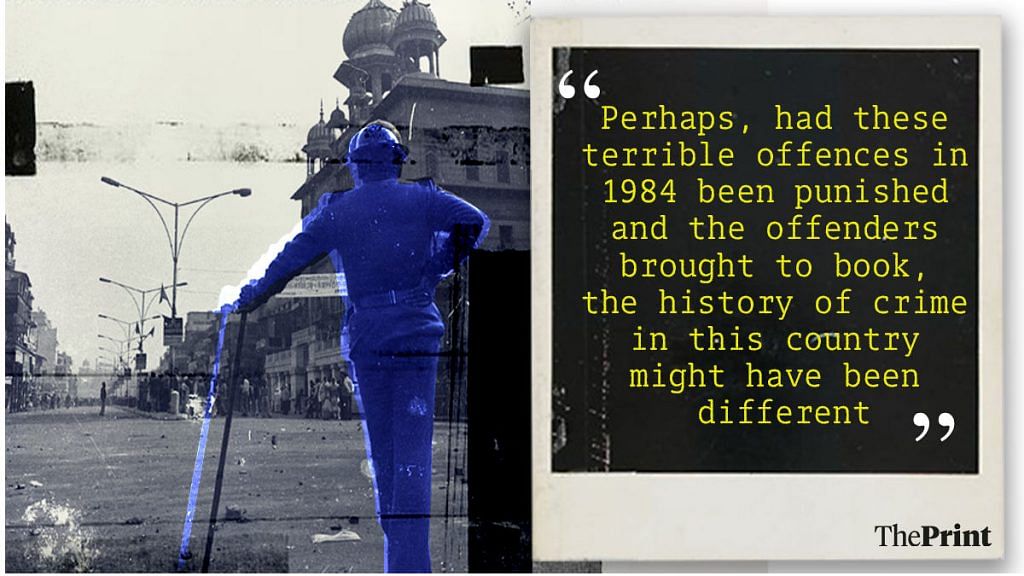
“Would these crimes fall in the category where the truth has become a casualty at the hands of investigator, prosecutor, and the trial?” the court asked.
The HC also issued notices to the accused and the Delhi government on the question of why a re-investigation and re-trial should not be ordered.
“Perhaps, had these terrible offences in 1984 been punished and the offenders brought to book, the history of crime in this country might have been different,” Justices Mittal and Malhotra observed.
“Treated as individual cases, while the culprits got away scot free, everybody else, the police, the prosecutors, even the courts, appear to have failed the victims, and, most importantly society,” it further noted.
Also read: Why it took 34 years to convict Sajjan Kumar in 1984 riots case
Summons not issued, ‘lip service’ to investigation
The Delhi High Court made convincing points about how some of the five cases filed by the widows were mishandled.
In some instances, complainants did not receive summons. In others, the summons could not be served since they were issued to addresses where houses had been burnt in November 1984.
The HC pointed this out and quoted from the acquittal judgment in a case filed by widow Jagir Kaur, who was both a witness and a complainant.
The HC pointed out that the trial court had accepted that she was “untraceable” based on a single summons and let off the accused.
“Her summons were issued but received back unserved and according to the report, she is untraceable. The IO (investigating officer) has also stated that she is untraceable,” said the trial court verdict, quoted by the HC.
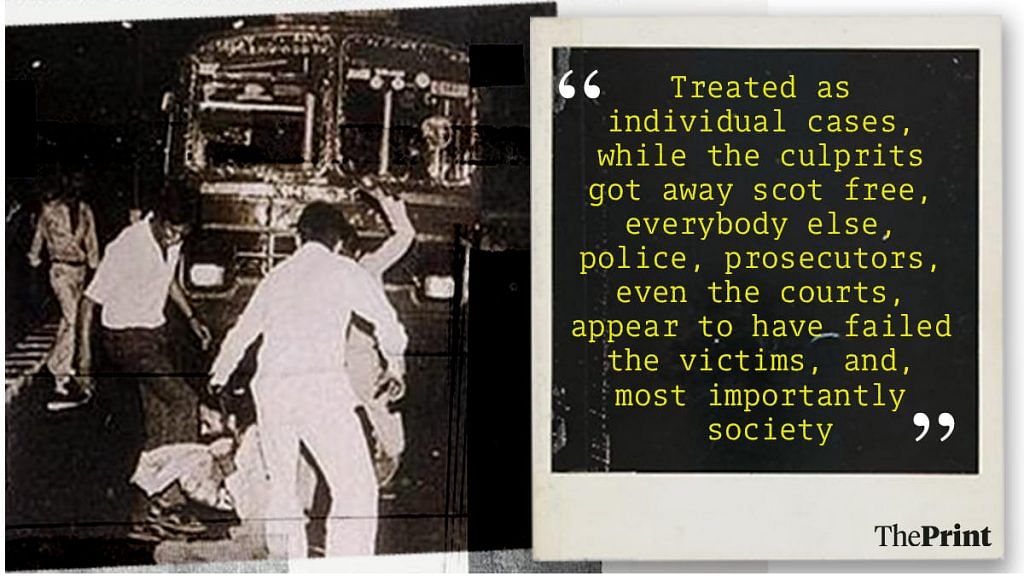
The HC further noted that all the trials in the five cases were completed within a period of just three to four months and that the chargesheets filed in the trial court appeared to show only “lip service” to the duty to investigate.
The judgments in the five cases, according to the bench, reflected a lack of compliance with the law and an alarming “haste to scuttle prosecutions and close trials”.
The court also noted that no efforts seem to have been made to trace the bodies or stolen materials, and that statements were not recorded from eyewitnesses, including relatives, neighbours, or any other members of the public who may have been present.
Yet, six years after the court’s forceful argument for a retrial, there has been little progress.
‘Show-cause notices have not yielded fruit’
In May 2017, Mahender Singh Yadav approached the Supreme Court against the Delhi HC’s interim order on the question of retrial in the 1984 riots cases.
The apex court then issued notice to the Delhi Police on 8 May 2017, and a copy of the petition was served to the then additional solicitor general P.S. Narasimha, who is now a sitting judge of the Supreme Court.
Yadav’s appeal in the Supreme Court was listed 17 times between 8 May 2017 and 1 January 2020.
Within this period, in December 2018, the Delhi High Court upheld the rioting conviction of Mahender Singh Yadav in another case and sentenced him to 10 years in prison.
The bench led by Justice S Muralidhar (now Chief Justice of the Orissa HC) also reversed the trial court order acquitting Sajjan Kumar for the murder of five members of a Raj Nagar family and upheld the convictions of four other accused.
Until this HC verdict on Yadav and others, the Supreme Court heard his appeal in the retrial case eight times.
On 19 January 2018, the court listed Yadav’s appeal for final disposal on 21 March 2018, but on the next three dates — 21 March 2018, 15 May 2018, and 26 April 2019 — the case was adjourned each time.
In July 2019, Yadav and other convicts questioned Justice Muralidhar’s judgment holding them guilty in the CBI case.
While issuing notice on this appeal, the Supreme Court tagged it with Yadav’s plea against Justice Mittal’s interim order on the question of retrial.
According to the case proceedings uploaded on the official website of the top court, Yadav’s two petitions were listed eight times between July 2019 and July 2020, but no substantial hearing took place on those dates.
In December 2019, Yadav filed an application for parole, which was rejected in May 2020.
The order noted that Yadav had spent only one year and four months in jail, while he had been sentenced to 10 years.
The court agreed to take up his bail plea in July 2020, but it was dismissed, despite Yadav suffering from Covid-19. A month later, Yadav died and the matter hasn’t been heard since.
A lawyer from Yadav’s legal team, who wished to remain anonymous, said that the deceased’s family members are keen to pursue the litigation in both cases so that he is absolved of all charges even if posthumously.
“We would soon be moving an application to substitute his legal heirs as parties,” the lawyer added.
Meanwhile, Daljit Kaur, the complainant in one of the five cases, has passed away.
“I never received any summons. Nothing conclusive has happened in the Supreme Court since then. The Delhi HC show-cause notices on retrial have yielded no fruit whatsoever,” Nirpreet said.
As of now, with over six years since the Delhi HC order, Yadav’s appeal remains pending in the top court.
(Edited by Asavari Singh)
Also read: 38 years on, Kanpur arrests 3 accused in 1984 anti-Sikh riots, hunt on for 51 others


